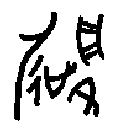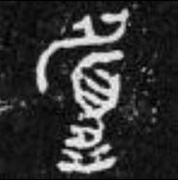I Ching, Yijing or Zhou Yi
"Oracle of the moon": © 2000 LiSe
 Yi Jing, Oracle of the Moon
Yi Jing, Oracle of the Moon

The image of hexagram 10
Lǚ, treading
What does it mean, 'inner' and 'outer trigram' (popup)
Lake below Heaven: interaction can only be beneficial when the rules are obeyed. When harmful actions are frowned upon or punished, when love and care are appreciated, when joy and sorrow can be shared, and when creatures recognize each others intentions, so they can react in the right way.


Ideogram of the hexagram name: at left a body, then two feet and/on a road: going. Top right a boat, also used to indicate shoes: Chinese shoes look like boats. The two feet might belong together: going to and fro. Walking the way back and forth. This is about the road, not a goal. The body at left might be a representative of a deceased, so he can be present at his funeral celebration. It calls for impeccable behavior, fitting the occasion and honoring the deceased.
At right an older (bronze) character.
The 'Great Image' says: Above is Heaven, below is the Marsh: treading. The noble one discriminates between high and low. He gives the ambitions of the people the suitable position.
Hex.10 is the contrast of 15, which is about balancing: adding what is missing. In hex.10 one goes one's own road, according to one's conscience and the laws of one's surroundings. Adapting where it is necessary for physical or social survival, but not groveling.
"Stepping on the tiger's tail" is a Chinese saying about taking a big risk. This hexagram is about staying alive or even prosper in surroundings which may be dangerous because others have power, but also about treading according to your own power and conscience. Observing the laws, rituals and local 'common sense' of a society can make the difference between living in a mansion or in jail. In the jungle between surviving or being someone's dinner. In your mind between being the proud captain or the insecure victim.
When one hunts the tiger, one has to know and follow the laws of the jungle, or one will oneself be hunted by the tiger. In speaking one has to use the right language, in acting the right gestures. In approaching the gods, one has to know the right rituals. If one has the appropriate style in all one's contacts, one's life, fate and inner feelings will react positively.
In daily life, rituals have degenerated to manners. The hermit leaves these worn-out and pinching shoes and searches for essential rituals.
Codes of behavior are the outward manifestation of inner jungle-rules.
The tiger is famous for his suppleness of treading. Tread as supple as the tiger, and you will never tread on anything that bites you.

